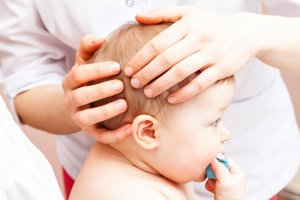What Should I Do if My Baby Hit His Head?


Reviewed and approved by the doctor Nelton Abdon Ramos Rojas
“My baby hit his head and I don’t know what to do!”
This is more common than you may think.
Childhood is the time when babies take the most risks. This is very concerning for the parents. Since we can’t control every one of our baby’s movements, they’re exposed to certain risks. Thus, it’s normal for them to hurt themselves at that age and you should know how to avoid it.
Babies are innocent by nature. They’re not aware of the dangers around them. They easily trip over furniture and don’t see toys on the floor.
The risky stage is usually between six months to four years, when child starts to discover the world more independently.
Perhaps this sounds familiar: “My baby hit his head very hard and now he won’t stop crying. ” A blow to the head can be serious, depending on the circumstances and the child’s symptoms.
It ‘s important to know where the dangerous areas of your home are. That way, you can help to keep your child from falling and hurting himself.
My baby hit his head: how do I help him?
Now that you know how susceptible your child is to hurting himself, it’s important that you know what kind of action to take. Most accidents only cause surface injuries on their head like bruises, wounds and pain where they got hit.
The steps to follow are very easy:
- First, keep your baby in a quiet and calm place.
- Elevate their head while you apply ice wrapped in a towel to the area where they were hit.
- Then, give them a little water to help and decrease the possibility of vomiting.
The important thing is to stay calm and to calm your baby. That will help you take control of the situation better. Depending on the type and intensity of the blow, you can also use some additional methods.
What to do for cuts
If they have a cut, you should wash the wound with clean water. If an object was broken in the accident, check to make sure there are no pieces left in the cut.
To stop the bleeding, use a piece of gauze soaked with hydrogen peroxide. Dab it on the area. If it’s a deep cut, it may require stitches, so you should go to a medical center.
What to do about bruises
If your child bruises, the procedure is simpler, but requires just as much care and attention.
When applying ice to the area, the size of the bruise or swelling should go down. If the size and inflammation worsen, it’s best to go to the doctor. This will help you prevent any major problems.
Symptoms to watch out for
Blows to the head are one of the most serious injuries for both children and adults. Since your head houses your brain, it‘s important to observe how your baby is doing hours after the accident.
One of the symptoms you should watch out for is drowsiness. Many think that you shouldn’t let your child sleep after he has hit his head.
However, don’t make them stay awake. If it is time to sleep, let them rest. When they wake up, watch to see if they are acting normally.
Nausea, blurred vision or disorientation are other symptoms to watch out for. These situations should be monitored carefully and you should keep track of their frequency.
Check if they feel any numbness in their extremities or if they have a headache. This could be the result of some type of cerebrovascular injury.
If any of these symptoms appear, go to the doctor. The doctor needs to assess the child’s level of consciousness and general condition. By carefully reviewing this, he will determine which tests will be necessary, such as radiography or echo, to evaluate the possibility of brain damage.
Conclusion
It’s important to note that, if your child’s general condition worsens, you should go to a medical center. This is crucial whether this happens immediately or within 48 hours after the accident occurred.
Keep in mind that, if you want to prevent your child from having this type of accident, you should look at their play area and the areas that they spend a lot of time. Remember that she’s a child and doesn’t care about her surroundings and the dangers that may exist.
And if someone says, “My baby has hit his head,” you now know how to help that other concerned mother.
All cited sources were thoroughly reviewed by our team to ensure their quality, reliability, currency, and validity. The bibliography of this article was considered reliable and of academic or scientific accuracy.
- Burrows, P., Trefan, L., Houston, R., Hughes, J., Pearson, G., Edwards, R. J., … & Kemp, A. M. (2015). Head injury from falls in children younger than 6 years of age. Archives of disease in childhood, 100(11), 1032-1037. https://www.ncbi.nlm.nih.gov/pmc/articles/PMC4680174/
- Asociación Española de Pediatría. (2013). Golpes en la cabeza, ¿qué nos debe preocupar https://enfamilia.aeped.es/temas-salud/golpes-en-cabeza-que-nos-debe-preocupar
- Martínez, I. M., & Minagorre, P. J. A. (2010). Manejo del traumatismo craneal pediátrico. Protocolos diagnóstico-terapéuticos de Urgencias Pediátricas SEUP-AEP. https://serviciopediatria.com/wp-content/uploads/2019/12/2008_Manejo-traumatismo-craneal-pedi%C3%A1trico.pdf
This text is provided for informational purposes only and does not replace consultation with a professional. If in doubt, consult your specialist.








